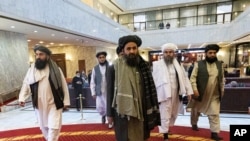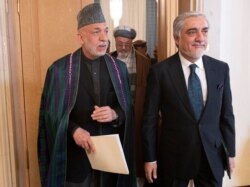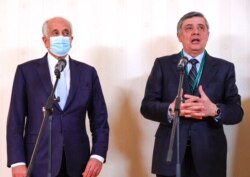The United States, Russia, China, and Pakistan have called on all parties in Afghanistan to reduce violence and the Taliban to forego their Spring offensive, the yearly renewal in attacks after a winter lull, in order to facilitate peace negotiations.
The demand was part of a joint statement after a conference on Afghanistan hosted by Russia in Moscow Thursday.
The one-day gathering was part of an intense diplomatic push to jumpstart a stalled peace process amid a looming deadline for withdrawal of foreign forces from the country. Some fear Afghanistan will descend into chaos if international forces depart without a negotiated political settlement in place.
Negotiations between a sanctioned Afghan government team and the Taliban started in Doha in September 2020 but have so far not yielded results.
An Afghan delegation led by the chair of Afghanistan’s High Council for National Reconciliation (HCNR) Abdullah Abdullah, and a Taliban delegation led by the group's political deputy Mullah Abdul Ghani Baradar, were also present.
The statement called on both sides to conclude their peace negotiations and supported the formation of “an independent, sovereign, unified, peaceful, democratic, and self-sufficient Afghanistan,” free of terrorism and drugs. It also called for the protection of the rights of women, children, minorities, and others.
“[W]e do not support the restoration of the Islamic Emirate,” the statement said, using the Taliban’s name for their own government.
“It is only through diplomatic peace negotiations and compromise that peace can be achieved,” said Russian Foreign Minister Sergei Lavrov in his opening remarks. “And the agreements that are to be reached have to include the interests of all parties.”
Russia’s top diplomat also said his country was ready to facilitate but Afghans had to take the lead.
“Outside parties like Russia should create the conditions for forces inside Afghanistan to negotiate and move forward,” Lavrov said.
The newly elected administration of President Joe Biden had been pushing to involve regional powers and other countries to try and bring the warring Afghan sides to negotiate. As part of its efforts, the U.S. has also floated the idea, supported by Russia, of a transitional government that includes the Taliban.
That idea is strongly opposed by Afghan President Ashraf Ghani who said elections are the only way to choose a government.
The push comes as the U.S. is reviewing an agreement the administration of former President Donald Trump made with the Taliban—a deal Biden called “not a very solidly negotiated deal,” in a recent interview with U.S. broadcast network ABC.
Under the deal, the U.S. is supposed to withdraw all forces from Afghanistan by May 1. However, an increase in violence, lack of progress in peace negotiations between Taliban and Afghan government, and a wave of targeted assassinations of human rights activists, journalists, and government officials have forced the U.S. to reevaluate its decision.
The Taliban, who have not directly attacked the U.S. or NATO forces since the February 2020 agreement, have warned that failure to stick to the withdrawal deadline would lead to a bloody response.
Some regional experts have suggested the U.S. negotiate a one-time extension in the deadline with the Taliban to salvage the deal.
Under this diplomatic push, two more international conferences are expected as early as next month, one hosted by the United Nations and the other by Turkey.
Moscow was also the venue for a February 2019 dialogue between senior Afghan opposition politicians and former top government officials, including former president Hamid Karzai, and the Taliban. That conference, which Ghani’s government criticized as “little more than a political drama,” paved the way for formal negotiations to start between Taliban and an Afghan government sanctioned delegation.
The idea for Thursday’s conference was first floated by Russian envoy to Afghanistan Zamir Kabulov in an interview with the country’s state-run Sputnik news agency last month.
Kabulov said the U.S. supported the idea of gathering a small group of countries with the most influence on the Afghan peace process. The format, called an “expanded troika,” included Russia, the U.S., China, Pakistan, and Iran—although Iran was hesitant to sit at the table with the U.S.
Kabulov said he hopes Iran will change its mind once tensions with the U.S. decrease.
In a Sunday meeting with Mohammad Sadiq, Pakistan's special envoy on Afghanistan, Iranian Foreign Minister Javad Zarif “stressed the need to promote regional cooperation to help establish peace in Afghanistan and preserve achievements gained by Afghan people,” according to the official Iranian news agency IRNA.
Meanwhile, the United Nations Secretary-General António Guterres appointed a new personal envoy on Afghanistan and the region Wednesday.
Announcing the appointment, the U.N. said Jean Arnault of France was tasked with helping find a political solution to the Afghan conflict.
“The responsibilities of the Personal Envoy include to liaise, on behalf of the Secretary-General, with regional countries with the aim of supporting the negotiations between the Islamic Republic of Afghanistan and the Taliban and implementation of any agreements which are reached,” U.N. spokesman Stéphane Dujarric said.
The appointment comes at a time when the U.S. is expected to ask the U.N to invite the foreign ministers of the U.S., Russia, China, Pakistan, Iran, and India for a conference on Afghanistan.
“It is my belief that these countries share an abiding common interest in a stable Afghanistan and must work together if we are to succeed,” U.S. Secretary of State Antony Blinken said to President Ghani in a letter leaked to the media earlier this month.
Iran’s foreign ministry spokesman Saeed Khatibzadeh told a weekly press briefing on March 8 that his country had “not yet received any invitation for any session on Afghan Peace Talks at the United Nations,” adding that “Iran will review the invitation whenever it receives any.” His remarks were printed in Iran’s official Islamic Republic News Agency.






